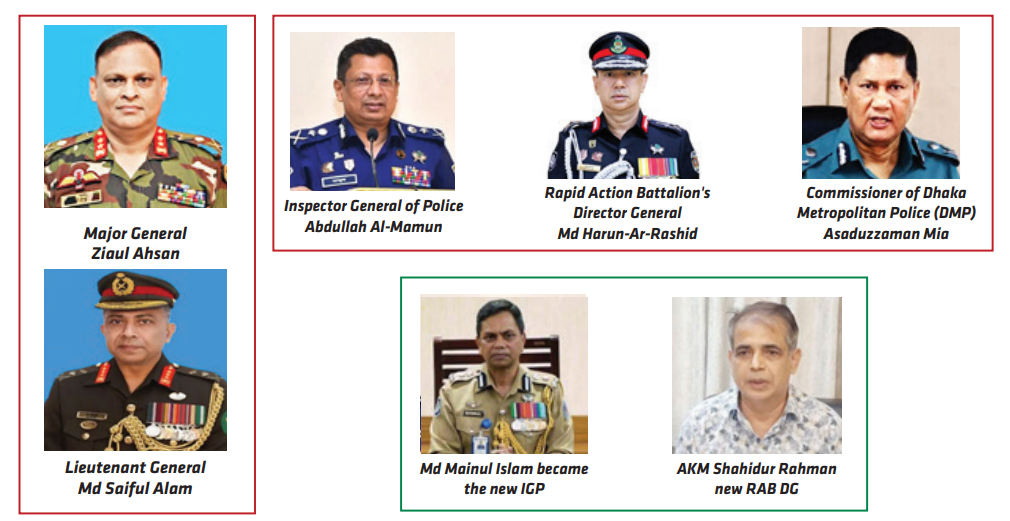
Administrationís Blanket Restructure
The interim government of Bangladesh, led by Dr. Muhammad Yunus has faced significant administrative challenges, resulting in what many describe as a "paralyzing" of the country’s governance.
Several key issues have contributed to this paralysis:
Massive Reshuffles in Military and Civil Administrations

One of the most destabilizing factors has been the widespread reshuffling and dismissal of key officials. While the Chief of Army Staff remained unchanged, many top positions in the military were reassigned. Notably, several senior officers perceived as aligned with the previous regime were removed or reassigned. Major General Ziaul Ahsan was dismissed from service, while Lieutenant General Md Saiful Alam was moved to the Ministry of Foreign Affairs. In total, key positions including Chief of General Staff and Commandant of the National Defence College were filled by new appointees considered more favorable to the interim government.
Moreover, since August 8, the inter im government has dismissed 33 permanent secretaries, including top officials such as the Inspector General of Police and heads of crucial departments like the Special Branch and Rapid Action Battalion.
Additionally, following the events of early August 20, 202424, the Bangladesh police experienced a major reshuffle. On August 7, 2024, the Inspector General of Police, the Rapid Action Battalion's Director General, and the Dhaka Metropolitan Police Commissioner were replaced. Md Mainul Islam became the IGP, and AKM Shahidur Rahman took charge of RAB. Over 32 station chiefs in Dhaka were transferred in a bid to strengthen control under the interim authority. Similarly, the Ansar force faced significant reshuffles, particularly after protests on August 20, 202424 demanding job nationalization and the abolition of certain work conditions. The interim government responded by transferring 19 senior Ansar officials, further contributing to the uncertainty within this paramilitary group. These administrative upheavals have compounded public concerns about the effectiveness of governance during this politically sensitive period.
In addition, superintendents of police and other key administrative officers have been reassigned arbitrarily. These actions have sparked concerns about the lack of due process and transparency, as many of these dismissals appeared politically motivated rather than merit-based.
Arbitrary Appointments and promotion
Nearly 300 officials, including secretaries, additional secretaries, police commissioners, and joint secretaries, have been appointed without adherence to established procedures. In a span of two weeks, three phases of promotions occurred in the public administration. Following the establishment of the interim government, the first phase took place on August 13, when 117 senior assistant secretaries were elevated to joint secretaries. This was succeeded by the promotion of 223 joint secretaries to deputy secretaries within the following week. On August 25, an additional 131 joint secretaries were promoted to the rank of additional secretary, raising the number of additional secretaries to 524. In total, the interim government has promoted 471 officers since August 8. This lack of due process raises concerns about transparency and meritocracy in the administration.
Vacancies in Secretary Positions Across Ministries:
As of the latest update, seven ministries and divisions within the interim government of Bangladesh are currently without appointed secretaries, leading to significant delays in development projects and administrative operations. Notably, the position of secretary for the Ministry of Civil Aviation and Tourism has remained vacant since the termination of Md. Mokammel Hossain's contractual appointment is on August 14. Furthermore, the secretary of the Ministry of Shipping, Mostafa Kamal, was designated as an Officer on Special Duty (OSD) on September 2. According to sources from the public administration sector, the vacant secretary positions are as follows:
- Ministry of Civil Aviation and Tourism
- Ministry of Shipping
- Planning Division
- Parliament Secretariat
- Financial Institutions Division
- Bangladesh Energy and Power Research Council
- Bangladesh Investment Development Authority (BIDA)
The absence of leadership in vital sectors has further exacerbated the country’s administrative paralysis. The post-August 5 reshuffles and administrative decisions have paralyzed Bangladesh's government, leading to delays in critical operations and fueling public dissatisfaction. This instability has exacerbated concerns about the effectiveness of the transitional government.
FILING OF BLANKET FALSE CASES
Dr. Yunus’s interim government launched a sweeping campaign against the leaders of the Awami League (AL), including former Prime Minister Sheikh Hasina. Thousands of cases were filed in a clear attempt to weaken the party. These cases, widely regarded as politically motivated, have led to widespread allegations of harassment and abuse of the legal system.
Key Figures and Context
Total Number of Cases: As of September 15, over 7,500 cases have been filed by the interim government, with a focus on key members of the Awami League. These cases accuse AL leaders of corruption, abuse of power, and incitement of violence, but critics argue that the evidence presented is either fabricated or insufficient. Targeted Individuals: Among the most prominent figures targeted is Sheikh Hasina, the former Prime Minister and leader of the Awami League. She faces 182 separate cases, all of which have been filed since August 5, accusing her of corruption during her tenure in office. Additionally, over 200 high-ranking members of the Awami League have been named in various charges, ranging from financial misconduct to incitement of public disorder.
Breakdown of Charges
Corruption Allegations: More than 60% of the cases accuse Awami League leaders of corruption, specifically related to government contracts, financial mismanagement, and bribery. However, legal experts have pointed out that many of these cases lack credible evidence, with 50% of the cases involving claims based solely on government reports with no independent investigations.
Public Disorder and Incitement: Another 25% of the cases involve allegations of inciting violence or organizing protests against the interim government. This includes charges filed against local Awami League organizers accused of mobilizing protests, with 1,500 protestors named in cases for participating in demonstrations held between August 10 and August 25.
Financial Crimes: Roughly 15% of the cases involve accusations of financial crimes, including money laundering and embezzlement. These charges often target high-level officials from Sheikh Hasina’s government and members of her close inner circle.